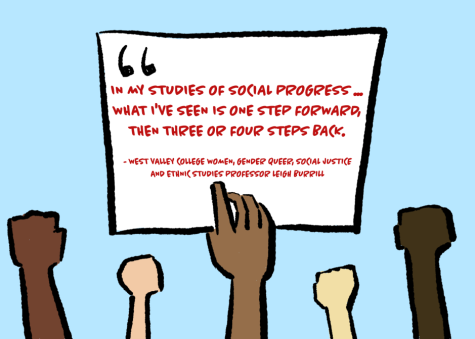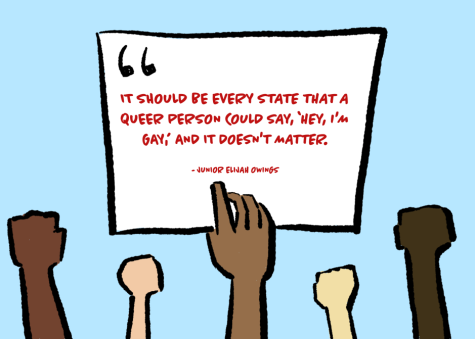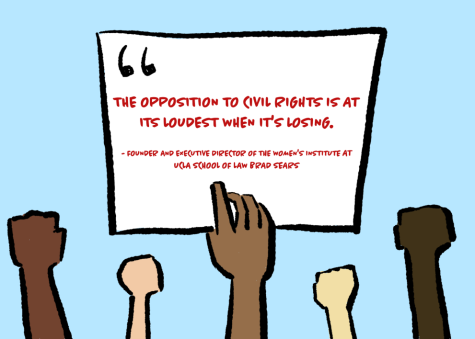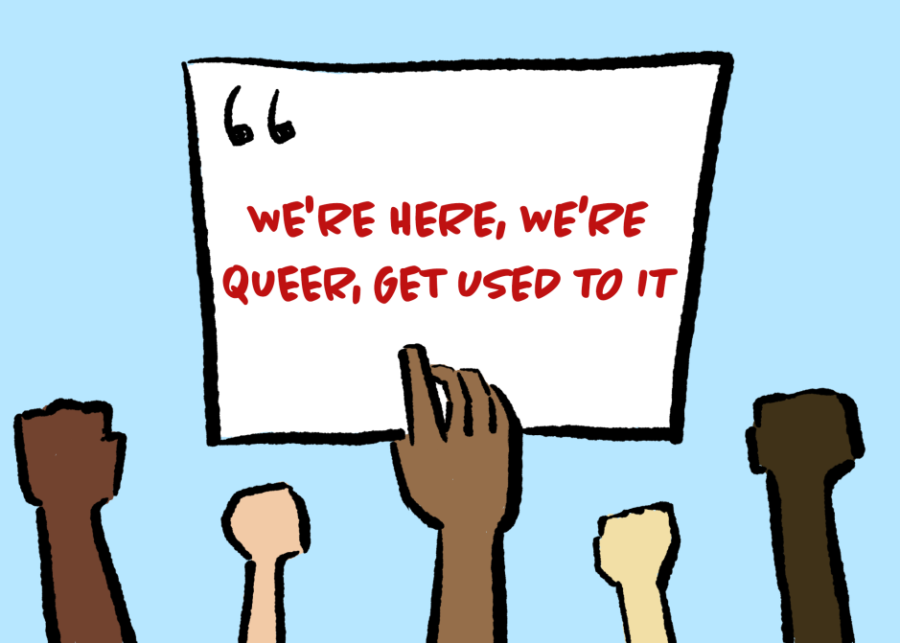Photo | Wikimedia Commons
“We’re here, we’re queer, get used to it,” was a common slogan used in the 90s during pride rallies.
One step forward, two steps back
Analyzing the impetus, implications and impacts of the recent uptick in anti-LGBTQ+ legislation in the U.S.
In 2022 alone, there have already been more than 200 anti-LGBTQ+ bills proposed, with about half targeting transgender individuals and most revolving around healthcare, sports equality or education. Following a growing trend of anti-LGBTQ+ legislation, this year is predicted to be the worst year in history for legal protections of LGBTQ+ individuals.
Progressive push
In the mid-1900s, views on LGBTQ+ rights were contentiously debated and embedded through legislation in response to the growing community. In 1973, Maryland became the first state to ban same-sex marriage. But in 1989, New York and California defined same-sex couples as families. In 1993, the Hawaii Supreme Court ruled that same-sex marriage can not be banned unless there is a compelling reason — however, Hawaii legislators promptly passed an amendment that banned gay marriage. In 1997, Hawaii again became the first state to offer domestic partnership benefits to same sex couples.
During that time, anti-LGBTQ+ legislation was mainly passed as a response to progressive legislation. When Hawaii legalized LGBTQ+ marriage on a district level, the federal response was outsized with Bill Clinton passing the Defense of Marriage Act in 1996, preventing same-sex couples from receiving federal benefits.
It wasn’t until the 21st Century that progressive measures began cementing LGBTQ+ rights. In 2004, Massachusetts became the first state to legalize same-sex marriage, prompting a wave of progressive states to follow, overturning bans on same-sex marriage and labeling them as “unconstitutional.” Finally, in 2015, the U.S. Supreme Court legalized same-sex marriage nationwide through the Obergefell v. Hodges case.
West Valley College history and political science instructor Tim Kelly describes how the sudden shift towards more progressive measures shows “how quickly the country moved in a direction that was so different” from previous decades. This push, along with an increase in LGBTQ+ representation in the media, contributed to heightened visibility and what Kelly believes to be an increase in awareness of the LGBTQ+ community. A record 7.1% of Americans now identify as a part of the community.
“More people were coming out for one thing,” Kelly said. “When you realize that your brother, your best friend, your daughter is homosexual, this changes your views. I also think celebrities like Ellen DeGeneres, for instance, when she actually came out on her program, that was a big deal, because it was on a primetime television show and it really helped to change the direction of gay rights.”
Current conservative legislation
Seemingly in contradiction to the documented progress, anti-LGBTQ+ legislation is still being proposed and passed throughout the nation — eight bills have already been passed this year, which is predicted to surpass last year’s total of 20 and become the worst year in recent history. These bills are being passed in conservative states and mainly target either education, sports and public health.
On March 28, 2022, Governor Ron DeSantis of Florida signed the Parental Rights in Education Bill, commonly coined as the “Don’t Say Gay” bill, which prohibits instruction on sexual orientation and gender identity in grades K-3. However, the bill also implicitly targets instruction for students of all grades, prohibiting teaching that is “not age appropriate for students in accordance with state standards.”
The bill, although directed at LGBTQ+ teachings, emphasizes a broader goal to reinforce the “fundamental rights” parents have regarding their child’s education by granting them more influence in their child’s personal life at school. The bill requires schools to tell parents when their child — no matter the age — receives mental health services or consultations about gender identity and sexuality. The bill also encourages parents to sue the school over teaching practices they disagree with, additionally forcing the district to cover the costs. According to the Washington Post, some schools have been pulling LGBTQ+ related readings off the shelf before it “starts a fight.”
Founder and Executive Director of the Women’s Institute at UCLA School of Law Brad Sears believes the bill is part of an attempt to privatize public education, vitalizing a core goal of the Republican party that frames public education as a place where “kids are going to be confused about their gender, learn critical theory and not understand to be proud of who they are in the country.” Sears acknowledges the fear that parents feel, but he also views it as a political tool to upend public education and put more money in the hands of private schools. Kelly agrees and emphasizes the impact of more parental oversight within schools.
“It may lead to abuse if the young person is afraid of coming out to their parents or family members,” Kelly said. “It also breaks a level of trust because students are sharing this information with school officials because they trust them [and] they don’t for whatever reason, want to tell their parents. So if students don’t have that level of trust, they’re probably not going to be sharing what may be an emotional period within their life. A counselor certainly would be qualified to help them deal with this situation. And if they can’t go to a counselor because they’re afraid that the counselor will have to tell their parents, that’s going to be a problem.”
Emily Gray, the transgender outreach coordinator for the LGBT Youth Center of Bay County and a member of the Florida Coalition for Trans Liberation, explains that Republicans, including DeSantis, felt emblazoned by Trump’s anti-LGBTQ+ rhetoric during his presidency, and are now attempting to “out-Trump Trump.” Additionally, Gray predicts that DeSantis will be a candidate for president in the next election, and believes he is attempting to pander to the voterbase that voted for Trump, which perhaps explains why he passed a Transgender Athlete Bill during the summer of last year.
Many of the current anti-LGBTQ+ bills revolve around transgender rights due to what Sears describes as an increase of individuals coming out as transgender and non-binary.
Similar to DeSantis, Texas Governor Greg Abbott signed Texas HB 25 into law on Jan. 18, 2022, requiring public school students to “compete in interscholastic athletic competitions based on biological sex.” State Rep. Valoree Swanson claimed one of her main reasons for authoring the bill was to “protect girls’ safety.” In a national poll that asked if “boys and men who say they identify as transgender [should] be allowed to compete in girls’ and women’s athletics,” 54.10% of voters selected “strongly disagree.” Currently, most of the anti-LGBTQ+ bills are directed towards transgender youth, sports being a heightened area of focus. On March 3, 2022 Iowa Governor Kim Reynolds signed HF 2416 into law, prohibiting transgender students from participating in academic sports programs that match their gender to “protect women’s sports.”
View this post on Instagram
Another aspect that legislation targets is public health. In February of 2021, Texas Attorney General Ken Paxton issued a legal statement that proceeding with gender-affirming medical care to transgender youths is constituted as “child abuse.” On April 20, the Florida Department of Health recommended against social and medical transitioning. Although these statements aren’t legally binding, they still target transgender individuals and attempt to restrict their rights.
The Idaho House of Rep. passed HB 675, which would make it a felony for doctors of parents to give hormones or puberty blockers to transgender minors; however, it is unlikely that the Senate will pass it. Prior to 2020, not a single state had introduced legislation to ban gender-affirming healthcare. However, in 2021, 22 states passed or considered bills that would limit access to gender-affirming care, with Arkansas being the first state to ban gender-affirming treatments for trans youth. In 2022, 20 states have passed or are considering such bills.
Alabama HB 322, a bill that would “require public K-12 schools to designate all rooms that are accessible to multiple students of one sex (such as bathrooms and locker rooms) to be used by male and female students on the basis of biological sex” passed in the Alabama Senate on April 7.
Sears believes that anti-transgender bathroom campaigns reflect the conservative strategy of painting a scenario of potential danger against children to sway concerned parents. He compares current campaigning to tactics used during the 2008 California Proposition 8, a proposition intended to ban same-sex marriage, where ads focused on marriage equality being taught to children at public schools.
“[The bathroom campaigns say] this is going to be scary for your kids because your daughter is going to end up in a bathroom with some predatory man — not a trans person but some predatory man,” Sears said. “And I think with the school sports [bills] and uniform care, it’s the same thing — somehow your kids are going to be impacted by this … They’re trying to reach parents and say, ‘You can’t just sit on the sidelines of this.’”
Sears says legislators are emphasizing a fear factor, attempting to pit groups against each other. He asserts that through banning trans youth from participating in athletics in junior high and high school, conservative legislators are “trying to pit young girls and women against trans people” and “parents of those young girls and women against the parents and families that include trans kids.” He also believes that bans on gender affirming care are an attempt to pit the government against families and the decisions they’re trying to make with their health care providers.
“It’s ironic because the Republican Party used to be known for supporting individual freedom and family’s ability to [make] decisions for themselves,” Sears said. “For the government to intervene and say even if the parents and the youth all agreed to start gender affirming care, the government has a role to stop that — I think is pretty extraordinary coming from a conservative party.”
Reasons behind the conservative pushback
A lack of awareness in a rapidly changing environment fosters what West Valley College Women, Gender Queer, Social Justice and Ethnic Studies Professor Leigh Burrill thinks is a heightened sense of fear. People might be unsupportive and afraid of the increasing wave of LGBTQ+ exposure due to its unfamiliarity, while misinformation and distrust in the medical and scientific community has led to an increase in polarization which politicians leverage by “cashing in on the collective ignorance” and grasping to touch a “public nerve.”
Pat Andrews, a retired political science professor, emphasizes the speed at which pro-LGBTQ+ legislation was passed, explaining how the backlash is a way for the older generation to stagnate this shift in order to regain control of the social landscape.
“They do not understand it [and] they fear where it’s going,” Andrews said. “Gay life has only been recognized and accepted in this country in the last 20 years. We didn’t have gay marriage 20 years ago. And it all came so quickly. And for many older Americans, it was too much to start managing what sexual identity you have and so that’s when I think you began to see all this backlash.”
UC Santa Cruz sociology lecturer Megan McNamara believes that the fear of change coincides with the fear that LGBTQ+ people will “pollute society”and that “giving them rights equates to condoning identities that they consider to be wrong, immoral, or non-existent.” She claims if same-sex couples were to enjoy “all of the trappings of traditional, heterosexual marriage,” it would eliminate straight privilege, and if transgender people were allowed full access to health care and social institutions like sports and employment, there would be no more cisgender privilege. She believes that acknowledging gender as a lived experience forces cisgender people to reevaluate their understanding of gender as biologically determined, and reevaluate the patriarchal privilege from which men benefit.
McNamara also adds that the backlash against the LGBTQ+ community isn’t unexpected — it’s common after any marginalized group achieves progress. The shifting legislation regarding LGBTQ+ rights may be only part of a larger trend of conservative pushback against progressive legislation.
“One common reading of mass incarceration and the War on Drugs is that it emerged as a means of pushing back against the gains that Black folx made during the Civil Rights Era,” McNamara said in an email. “Conservative backlash … to any forward progress is a cycle that has been repeated countless times across countless cultures. People who identify as conservative typically want to keep things as they are (literally: conserve) or seek to go back to a romanticized, usually mythic, time in the past when everything ‘used’ to be good. Progress creates more fear of change and the response is backlash. It is definitely not specific to this moment or this issue.”
Burrill agrees that the struggle around LGBTQ+ rights has been constant — when same-sex marriage was legalized in 2015, she hailed it as a “moment of progress” for the community but wasn’t surprised with the backlash that followed, comparing it to abortion rights, which are also currently under attack.
“For every advance that we’ve had, there’s all sorts of backlash going on in the political arena that involves people trying to undo the progress,” Burrill said. “We have a little bit of progress and then fear mongering. Seems to be the way this country goes. In my studies of social progress moments over the past, what I’ve seen is one step forward, then three or four steps back.”

Kelly adds that the recent conflicts are part of a “culture war that the conservatives have honestly been fighting for the last 100 years,” citing a reinforcement of traditional and religious values. To him, the specific focus on anti-LGBTQ+ legislation is a play to sway more Americans to the Republican party, since adding anti-transgender laws and critical race theory bans to the already existing pro-life movement means a wide variety of people can be attracted to the party’s actions. Andrews adds that the upcoming midterm elections this year can explain the increasing rate at which legislation is being proposed. Kelly also sees the conservative dominated Supreme Court as a roadblock to passing progressive legislation and an encouragement for conservative ones.
“The key to building any kind of political coalition is to create a package in which you bring as many people on board as possible,” Kelly said. “[Republicans are saying], ‘You may be pro choice, but I know that you’re opposed to CRT teaching. So support us.’ And that’s how you do it. You build a broad coalition. And it seems to be working pretty well for the Republican Party, and conservatives in general.”
Why we should care
More than 58,000 transgender youth are at risk of losing access to gender-affirming healthcare. Johnathan Gooch, the communications director for Equality Texas, has had families he works with tell him they have been denied care by healthcare workers due to Paxton’s statement. In Texas, there’s no public referendum and bills get reviewed biannually, so current legislation being proposed won’t be reviewed until 2023. However, “because of the way this opinion is written, and because people don’t fully understand how the Attorney General’s opinions fit within the law,” some doctors and therapists were concerned that they might have to report child abuse because of mandatory reporting requirements, and chose to stop treating their transgender patients so they wouldn’t have to report them or to avoid legal repercussions.

“It’s been really traumatic for trans kids [and] their families as well,” Gooch said. “[Healthcare professionals] are trying to do their best to protect the trans kids, but they’re also cutting off medical care to do that. So it’s just a lose-lose situation right now.”
Even though the current anti-LGBTQ+ legislation is being passed in mainly conservative states, junior Elijah Owings emphasizes how more people need to talk about the harm done to LGBTQ+ youth in more liberal states as well. He thinks that MVHS students don’t acknowledge it since California is “so supportive that it doesn’t really affect us, so [we think] we shouldn’t pay attention to it.”
“Just because one state or a couple states are safe for the LGTBQ+ community doesn’t mean that [we should be satisfied],” Owings said. “It should be every state that a queer person could say, ‘Hey, I’m gay,’ and it doesn’t matter. I feel like … what’s wrong nowadays is that we only protect those few states [where] we have those rights and ignore the other states who need our attention, because there are people there who are getting harassed because of this.”

Owings adds that anti-LGBTQ+ legislation being passed in one state also makes it more likely to be passed in others, comparing it to how laws restricting rights to abortion have spread.
Burrill echoes the importance of staying aware of legislation across the nation, explaining how her transgender and queer friends who struggled with coming to terms with their identities during the ‘70s and ‘80s describe how hurtful it is to hear stories of new youth being marginalized in states that are “hostile to them.” She thinks that these bills not only highlight the increasingly polarized state of our nation, but they also strengthen the importance of having empathy and compassion for each other.
“We have to continue to try to be a beacon of hope,” Burrill said. “We have to be enlightenment for people who are just too limited in their scope and experience to realize that there’s a whole beautiful rainbow diversity world out there [and who] might not understand that they’re not going to make [it] go away by legislating against it. It’s sad, unconscionable and disgraceful. The U.S. likes to fancy itself as being about liberty, freedom, justice for all. [But this is] discrimination.”
Owings says that the legislators helping to pass anti-LGBTQ+ bills either “don’t think how dangerous this can be for people or don’t care,” since the Parental Rights in Education bill in Florida may lead LGBTQ+ youth to repress their identity or be outed to abusive households. He is also frustrated at legislators for their infringement on personal freedoms and criticizes the current political landscape.
“It’s so stupid that they still believe they have the absolute rights to just control everyone else’s lives,” Owings said. “And it’s such bulls–t that they think they can just do that to everyone. So many minority movements, like the LGBTQ+ movement, all have been going on since the ‘50s trying to get these rights that were taken away from [them] because society decided that [it wasn’t] OK, because of their belief that it’s not OK for you to be different, and it sucks.”
Gray is also concerned about the future of Gender-Sexuality Alliances in Florida, as GSAs are clubs that need a faculty member sponsor. If teachers are no longer allowed to be involved, it potentially puts an end to a traditionally safe space for LGBTQ+ students. Additionally, she has noticed that conservatives in Bay County, an already overwhelmingly Republican county, have made their dislike of the LGBTQ+ community more obvious.
“[In the comments of] anything on any of the news sites here … it’s just a bunch of people talking about how everybody that tries to support trans youth or LGBTQ+ youth are a bunch of groomers and pedophiles,” Gray said. “It’s affecting the kids in a really bad way. There’s kids that haven’t come out yet, but they’ve been talking with us. And now they’re probably not going to come out because of this, which is going to cause more harm. Anybody that’s been in the closet any amount of time knows how hard that is. So that’s the biggest impact I’ve seen so far. The kids are scared.”
Moving forward
Gray warns that the current wave of anti-LGBTQ+ legislation is only the start of a broader movement that will intensify in Florida and spread to other states.
“This is just the first step for them to try to do something more serious,” Gray said. “I feel like this was just a little, test the waters, and then pretty soon after this, they’re probably gonna try to do some stuff like they did in Texas … We already anticipated something similar to this happening. We just didn’t think it was gonna happen this quickly.”
Since current anti-LGBTQ+ legislation is being passed on a state level, the federal government can intervene by sweeping bills to overrule standing ones and enforce a new standard. During the start of his presidency, President Joe Biden passed Executive Order 13988 that reversed the ban on transgender individuals serving in the military — which was passed during the previous administration — and declared March 31 as Transgender Day of Visibility. One bill currently making its way through Congress is the Equality Act, an amendment to the Civil Rights Act of 1964 that was introduced in Feb. 18, 2021, and will prohibit any form of discrimination based on gender identity and sexual orientation. Gray believes that passing it is important to make sure that current pro-LGBTQ+ bills don’t get overturned.
“Trans people are not a protected class under the law,” Gray said. “It’s very ambiguous, and that’s why the Equality Act is very important. If we can get the Equality Act passed, then trans people will have a lot more protection. But until that passes, everything that has been done under President Biden can be undone if a Republican president gets in next time. They can just change everything again, just like Trump did.”
However, with a 50-50 Senate and a split House of Representatives, it’s unlikely that the current administration will be able to pass it.
Contrasting the federal stagnation, progressive states are introducing their own legislation to combat these bills: Senator Scott Wiener (D-California) proposed SB-923 — a bill which would require competent gender-affirming care to be made available throughout the state of California — which was amended by the Senate on April 19. Gray said this bill would “create a safe haven for trans people to come from the states that were impacted by these bills,” and said pushing to pass this bill would be “the best way” Californians can help.
Burrill thinks that working to prevent anti-LGBTQ+ legislation through a proactive stance is as important as responding to it, emphasizing “education, education, education” — which means highlighting LGBTQ+ artwork and recognizing the frequency in which people encounter LGBTQ+ individuals.
“We’re not just in the movies. We’re not just in Hollywood. We’re not just in San Francisco,” Burrill said. “We’re your teachers. We’re your lawyers. We’re your doctors. We’re your friends. It’s creating a safe environment for everyone to be able to be themselves and then for everyone to learn from each other and we’re all different. I think that what we can do as individuals within the queer community is be out about who we are and and try to be visible, especially as adults, to be role models and examples to the younger generation that might be terrified to do so particularly if they’re in really misinformed community.”
Focusing on education has been a core goal of MVGSA, and they have implemented discussions with freshmen about the LGBTQ+ community. This year, in addition to the traditional biology panel during the sex education unit, MVGSA started a freshman literature panel. This panel takes place during the “Aristotle and Dante Discover the Secrets of the Universe” unit and is hosted by LGBTQ+ GSA members who explain their own coming out journeys and how being a part of the community has affected them.
According to junior and MVGSA president Annika Lee, these panels are important because they bring more awareness to the LGBTQ+ community in MVHS.
“A lot of our parents are immigrants and they’ve immigrated from relatively conservative countries,” Lee said. “They don’t have a lot of experience with queerness or the queer community, and that’s been passed on to their kids. And we get a lot of casual homophobia of like, ‘Ha ha, that’s so gay’ and gay being used as an insult or people just making jokes about gender and sexuality in ways that aren’t appropriate. So having these talks and talking with the freshmen and opening their eyes to the queer community… is a step in the way of broader acceptance within Cupertino itself.”
Lee also recommends reading LGBTQ+ books to gain more insight into the community. (Books they recommend are listed in Part 6: Resources). They say that the characters can help non-LGBTQ+ readers ” see queer people as people,” and representation can also be validating for those that are.
MVGSA also celebrates LGBTQ+ holidays by hosting school wide activities in order to spread awareness. This year it observed Transgender Day of Visibility, TDoV, through hanging star-shaped posters that featured transgender or non-binary celebrities. On TDoV, the club provided sidewalk chalk for students to draw with in the academic court. On the Day of Silence the week after, which is celebrated on the second Friday of April, some students stayed silent for the day to recognize the harmful effects of bullying on LGBTQ+ individuals. MVGSA provided placards for those students to show to their teachers.

This year, MVHS also started an Out for Safe Schools program for teachers. Teachers learn about how to handle gender and sexuality situations in their classrooms through a short 25 minute program and then receive a badge to identify them as a member of OFSS.
Burrill also thinks that there are multiple ways for those living in California to support individuals affected by legislation, emphasizing on “using our voices.” This includes supporting progressive candidates — she recalls how her friends went to conservative states over the summer to help campaign for “informed, lightened and empathetic” runners. Kelly sees the influence of “boots on the ground” methods — such as protests and movements — on anti-LGBTQ+ legislation, but also points out that students can still make an impact from their bedrooms. He suggests writing letters to local Congressman, voting when eligible or leveraging social media platforms, which Burrill thinks can foster communities and promote positivity.
“Just having a place to have a forum to talk to people [like], ‘Hey, I’m here on Instagram, what do I do? My parents won’t accept me or my dad kicked me out or I think I’m trans but I’m in a really religious household where we’re not even allowed to talk about [it],'” Burrill said.
Kelly thinks it will take time for broader transgender identity acceptance, but he also considers himself an “optimist at heart” and looks towards the coming generation for pushes of change, referring to the increase in progressive ideals fostered within, urging the younger generation to “be active.”
McNamara agrees since “older people often have a much harder time accepting significant changes to their belief systems, so younger ones can make a big difference by making it clear that times have changed.” However, she suggests doing this through a passive approach since “aggressive and accusatory” remarks can exacerbate polarization.
“If you’re a straight/cis person and you hear your parents or older relatives making homophobic or transphobic comments, tell them how much you appreciate your queer friends,” McNamara said. “For example, I’m 46 years old and one thing I do a lot is talk about how much trans people have made a difference by making it easier and safer [for] everyone, including me, to experiment with gender. I think a lot about how much more I might have been able to craft an authentic identity when I was young if there had been other people around me doing the same thing with pride and enthusiasm. Trans people’s courage in being out and living their best lives actually makes my life better, and the lives of everyone I know. This is the kind of thing I would share with someone who expressed a transphobic view.”
Sears emphasizes that no matter what states like Florida and Texas do, there are LGBTQ+ people and allies throughout the country. President Biden has publically supported LGBTQ+ people many times, including when he urged the passing of the Equality Act. Sears argues that conservative legislature “cannot take away” that support and this progress means “there’s no going back.”
“The opposition to civil rights is at its loudest when it’s losing,” Sears said. “So this isn’t a moment to despair or give. The kind of reaction right now has been caused by the progress, and it doesn’t mean that progress will continue to be linear, but it does mean we have to continue our work to make sure that we continue that further progress. I think it’s easy to lose heart in moments like this, but there’s a big wave of bills because because now in the last several years, really transgender and non binary youth are being recognized and respected more than ever, and so we need to be sure we don’t lose heart, but keep moving forward.”

Burrill agrees with Sears, emphasizing that the attempt to reverse social progress will fail because “once the cat is out of the bag, it’s pretty hard to put [it] back [in].” In response to the tenacity of anti-LGBTQ+ legislation, she encourages the rest of the community to “fight harder.”
“They think they might be able to eradicate LGBTQ+ folk … and it’s not going to work,” Burrill said. “There was an old chant, in the 90s: ‘We’re here, we’re queer, get used to it’ that you would hear at rallies and parades, and it was an appeal to the idea that queer folk aren’t going away — we’re always going to be here; we’ve always been part of culture and we always will.”
Resources
Media:
– Book: Moon Was Ours – Anna-Marie McLemore
– Book: Picture Us in the Light – Kelly Loy Gilbert
– Book: Aristotle and Dante – Benjamin Alire Sáenz
– Book: Carry On – Rainbow Rowell
– Animated show: She-Ra and the Princesses of Power
– Animated show: The Owl House
This story was originally published on El Estoque on May 9, 2022.

